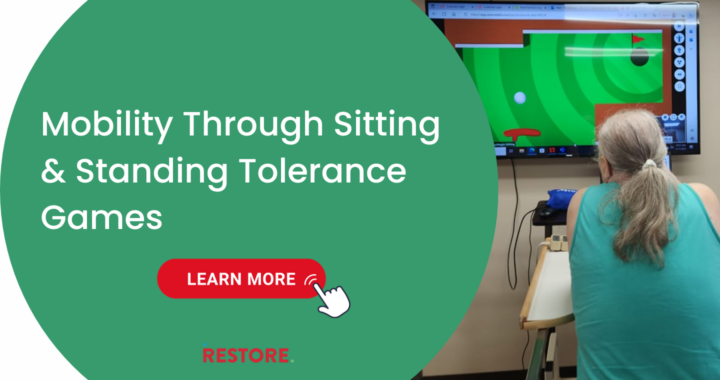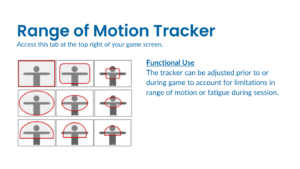As therapists, our goal is to bridge the gap between therapy and everyday life, ensuring that our interventions translate into tangible benefits for our residents. RESTORE games are a pivotal tool in this mission, especially when it comes to honing a key skill: Sitting and Standing Activity Tolerance.
-
Mobility for Greater Independence
Mobility is the cornerstone of independence, and sitting and standing are actions that most residents perform multiple times a day. RESTORE games are designed to mimic these everyday movements, providing a safe and controlled environment to practice and improve. The repetitive nature of the games helps reinforce the neuromuscular pathways essential for these fundamental movements, paving the way for smoother transitions in real-world scenarios. -
Strength and Balance
Strength and balance are the dynamic duo of fall prevention. Our games target the specific muscle groups and motor skills involved in posture and locomotion. As residents engage with the games, they are essentially participating in a form of resistance training, which can lead to increased muscle mass and better balance — both critical factors in reducing fall risk. -
Endurance for Daily Activities
Activity tolerance is all about endurance. The more residents play, the more they can do. RESTORE games are cleverly designed to keep residents engaged for longer periods, helping to increase their cardiovascular and muscular stamina. This means residents can enjoy daily activities — from leisurely walks to gardening — with less fatigue. -
Tracking Progress
With our gaming platform, therapists can easily monitor a resident’s progress in activity tolerance. This data is invaluable in setting goals, adjusting care plans, and providing residents with visible proof of their improvements, which can be incredibly motivating.
-
Adaptable to All Ability Levels
Every resident is unique, and so are their abilities. Each game can be tailored to meet a wide range of needs, ensuring that everyone can participate and reap the benefits, regardless of their starting point.
-
Injecting Fun into Therapy
Let’s face it: therapy can be hard work. But when it’s game-based, it’s also fun! By turning therapy sessions into engaging and entertaining activities, you can improve resident participation and adherence to therapeutic programs. A resident who looks forward to therapy is a resident who is more likely to engage in it consistently and with effort.
-
Promoting Holistic Well-being

